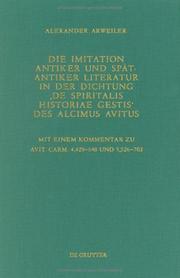| Listing 1 - 5 of 5 |
Sort by
|
Book
Year: 1859 Publisher: Louvain : Vanlinthout,
Abstract | Keywords | Export | Availability | Bookmark
 Loading...
Loading...Choose an application
- Reference Manager
- EndNote
- RefWorks (Direct export to RefWorks)
Book
ISBN: 2851213180 9782851213181 Year: 2022 Publisher: Paris Institut d'études augustiniennes
Abstract | Keywords | Export | Availability | Bookmark
 Loading...
Loading...Choose an application
- Reference Manager
- EndNote
- RefWorks (Direct export to RefWorks)
"Avitus of Vienne is the author of five poetic books of the Spiritual History celebrating the importance of Christ in baptismal catechesis by the glorification of the patriarchs Adam, Noah and Moses. Catholic bishop belonging to the Gallo-Roman aristocracy, Avitus is a man of great classical learning. The present study examines Avitus' poetic style, by combining a narratological approach with the methods of traditional philology. This analysis highlights the importance of the two auctorial voices constructing the poem: the voice of the bishop, formed by the practice of the liturgy of the Word, and the voice of the poet, steeped in rhetoric and paying tribute to classical poetics. These crossing voices produce a poem accessible to a large audience, whether contemporary or posterior to the 6th century - we know that the poem has enjoyed wide circulation during the middle Ages. Secondly, the analysis focuses on the construction of the poetic narrative, explores the adaptation of the epic codes to the transmission of the Christian faith and emphasizes Avitus' debt to the Latin epic poets. Finally, the stylistic and metrical study proves the perfect mastery he has of the hexameter"--Back cover.
Latin poetry --- History and criticism --- Avitus, --- 276 =71 AVITUS, ALCIMUS ECDICIUS --- 276 =71 AVITUS, ALCIMUS ECDICIUS Latijnse patrologie--AVITUS, ALCIMUS ECDICIUS --- Latijnse patrologie--AVITUS, ALCIMUS ECDICIUS --- 276 =71 AVITUS, ALCIMUS ECDICIUS Patrologie latine--AVITUS, ALCIMUS ECDICIUS --- Patrologie latine--AVITUS, ALCIMUS ECDICIUS --- Avitus, Alcimus Ecdicius --- Avit de Vienne --- Avitus of Vienne

ISBN: 3110162482 3110803356 Year: 2011 Volume: Bd. 52 Publisher: Berlin ; Boston : De Gruyter,
Abstract | Keywords | Export | Availability | Bookmark
 Loading...
Loading...Choose an application
- Reference Manager
- EndNote
- RefWorks (Direct export to RefWorks)
Literature, Ancient. --- Avitus, --- Bible --- History of Biblical events --- Avitus, Alcimus Ecdicius, --- Avit, --- Alcimus Ecdicius Avitus,
Book
ISBN: 9783515128780 9783515128728 3515128786 Year: 2021 Publisher: Stuttgart Steiner
Abstract | Keywords | Export | Availability | Bookmark
 Loading...
Loading...Choose an application
- Reference Manager
- EndNote
- RefWorks (Direct export to RefWorks)
Die Briefsammlung des Avitus von Vienne entstand im 5./6. Jahrhundert n. Chr. Sie enthält knapp 100 Schreiben aus der Korrespondenz des Bischofs mit bedeutenden Zeitgenossen. Diese behandeln (kirchen-)politische Angelegenheiten ebenso wie Alltägliches oder literarische Fragen, dienten Briefe doch nicht nur zum Nachrichtenaustausch, sondern überdies zur Kontaktpflege, zur Gemeinschaftsstiftung und zur Selbstdarstellung. Insbesondere die letzten beiden Funktionen bedingten auch ihre Zusammenstellung zu Sammlungen.
E-books --- Brief --- Selbstdarstellung --- Arianismus --- Latein --- Avitus, Alcimus Ecdicius --- Königreich Burgund --- (Produktform)Electronic book text --- Traditionsbezug und Transformation --- Alte Geschichte --- Avitus von Vienne --- Briefliteratur --- Briefsammlungen --- Epistolographie --- Frühmittelalter --- Gallien --- Spätantike --- frühes Christentum --- late antique epistolography --- letter collections --- self-fashioning --- spätantike Briefe --- spätantiker Bischof --- (VLB-WN)9553 --- Akakianisches Schisma --- Lateinisch --- Lateinische Sprache --- Latinofaliskisch --- Latinistik --- Arianer --- Christologie --- Arius --- Briefschreiben --- Korrespondenz --- Briefwechsel --- Literarischer Brief --- Briefverkehr --- Briefe --- Autobiografische Literatur --- Selbstinszenierung --- Selbststilisierung --- Selbstpräsentation --- Avitus --- Avitus, Alcimus E. --- Alcimus, Ecditius A. --- Ecdicius Avitus, Alcimus --- Alcimus Ecdicius Avitus --- Avitus, Alcimus --- Pseudo-Avitus --- Avito, Alcimo Ecdicio --- Avitus Viennensis, Alcimus E. --- Avitus, Alchimus --- Alcimus --- Avit --- Alcimus Ecdicius --- Avitus, Sextus A. --- Ecdicius --- Adelphus, Johannes --- Lazius, Wolfgang --- Molther, Menrad --- Murmelius, Johannes --- Ringmann, Matthias --- Trithemius, Johannes --- 455-518 --- Burgunderreich --- Burgund --- Königreich --- Self-fashioning
Book
ISSN: 05534003 ISBN: 9783110251548 9783110251555 3110251558 1283400073 9786613400079 311025154X Year: 2011 Volume: 66 Publisher: Berlin New York De Gruyter
Abstract | Keywords | Export | Availability | Bookmark
 Loading...
Loading...Choose an application
- Reference Manager
- EndNote
- RefWorks (Direct export to RefWorks)
Während des sog. zweiten Reichs der Burgunder an der Rhône (etwa 443 bis zur Eroberung durch die Franken 534) entstand eine selbständige burgundische, "arianisch"-homöische Reichskirche. Das führte zu Auseinandersetzungen, aber auch zu einem intensiven theologischen Austausch mit der überwiegend nizänischen gallo-römischen Bevölkerung. Besonders das Werk des Bischofs Avitus von Vienne, seine reichhaltige Korrespondenz, theologischen Fragmente und Homilien geben einen unmittelbaren Einblick in die Zeit. Die Monographie führt in die Geschichte des Reichs der Burgunder ein und bietet erstmals ausgewählte Briefe und Fragmente des Avitus mit deutscher Übersetzung und Kommentierung. Im Mittelpunkt steht der theologische Austausch mit dem burgundischen König Gundobad. Die Briefe und Fragmente weisen auf kirchenorganisatorische Probleme hin - ob z.B. Kirchengebäude der "Arianer" genutzt werden können - sowie auf Religionsgespräche und theologische Diskussionen, besonders über den heiligen Geist (filioque). Es wird erstmals genauer beschrieben, was "arianisch" zu jener Zeit in Burgund bedeutete im Unterschied zu den gleichzeitigen theologischen Debatten im Reich der Vandalen.
Avitus, --- Burgundy (Kingdom) --- Homoousian controversy --- Church history --- 273.4 --- 27 <44> --- Arianisme --- Kerkgeschiedenis--Frankrijk --- 273.4 Arianisme --- Avitus, Alcimus Ecdicius, --- Avit, --- Alcimus Ecdicius Avitus, --- Bourgogne (Kingdom) --- Arles (Kingdom) --- Church history. --- Arianism --- Avitus ep. Viennensis --- Avitus, - Saint, Bishop of Vienne --- Burgundy (Kingdom) - Church history --- Homoousian controversy - Burgundy (Kingdom) --- Arian Controversy. --- Avitus of Vienne. --- Burgundian. --- Church History. --- Migration Period.
| Listing 1 - 5 of 5 |
Sort by
|

 Search
Search Feedback
Feedback About UniCat
About UniCat  Help
Help News
News